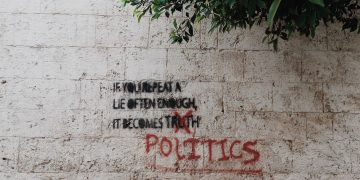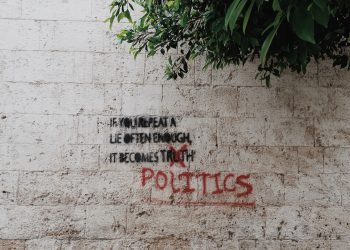Authenticity and the question of: “to share, or not to share?”
My social feeds are swamped with advice, commentary and news on the Corona virus, as information spreads in the same logarithmic virility as the bug itself. In this saturated environment, authenticity has become the most valuable commodity. “Is it true? And therefore, is it relevant to me?”
Authenticity is the ground upon which trust is built, and thus, it provides one of the best indicators of the strength & durability of the relationship between the content and the audience.
But, has authenticity has been hijacked by our emotions. Is what we see as authentic necessarily accurate or appropriate?
Take this news broadcast by Angela Merkel:
https://www.youtube.com/watch?v=F9ei40nxKDcu0026feature%3Demb_title
Measured, serious and clear. No catastrophising, it has emotion, but is not ruled by emotions. Compare this to the emotional tone and wording in this SKY video on the Corona virus in Northern Italy or the White House briefings on the crisis. Which is more “authentic”? For instance, Trump’s statement about fighting the “Chinese virus”:
“The world is paying a very big price for that they did,” Trump said, referring to his claim that Chinese officials did not fully share information sooner about the coronavirus outbreak after it began in China.
https://www.cnbc.com/2020/03/19/coronavirus-outbreak-trump-blames-china-for-virus-again.html
Calling it the “Chinese virus” is not factually incorrect if our naming convention for disease is built around the point of origin (which it is not, and here are the guidelines for naming conventions recommended by the WHO). Is it “authentic” in that it’s true and relevant? Sure. But, this explodes into a maelstrom of twitter hate as we devolve into the semantics of truth. We pick a side and we polarise. While debate is essential, there is no value if we lock out the ability for us to progress towards clarity. We must consider how we frame the facts. What is the intention of the communication and the end result?
If our media appeals to genetically hard-wired emotional triggers, we eliminate nuance and we will not escape this quagmire. Truth is not black and white, and it changes over time and contexts. If we are looking for a Disney narrative with a pantomime villain, it’s a delusion.
Complexity means we have to work harder as an audience to understand the multiplicity of facts.
The virus originated in China. The Chinese government did not sound an early warning. However, calling it the Chinese virus creates an “us and them” relationship, and who will suffer the consequences? It will undoubtedly have collateral damage for Chinese people around the globe. That doesn’t mean we shouldn’t be taking the Chinese government to task, or tackling the problem of the enormous trade in endangered animals that China engages in. Each of these are issues separate from the crisis that the Corona pandemic now presents to the globe.
Let’s blame “the media”? Well, there is shared responsibility here. We are engaged in a two-way conversation, because by pressing “like” or “share” we have become broadcasters, whether we want that responsibility or not. Are you considering the consequences of the content you share? It’s hard work. We can’t just fire off a trigger-happy post because it generates traffic. We need to interrupt the auto-pilot by which most of us engage with the world of social media.
Here are some tips worth considering; I call it the “sticker” principle. (This comes from STICR: an acronym for Sourcing,Trustworthy, Interrogated, Clarifying and Repercussions)
1.) Have you found a source of trusted content, rather than just a consistent one? Let me suggest for example you sign up to Medium. Take a read of their Corona coverage and consider the quality of information.
2.) Does this content interrogate and clarify thinking? Ultimately it is only through our conversations that we can further our understanding of the world. That doesn’t mean only sharing media we agree with (that’s just cognitive bias at work). Can you distil what you have learnt, or explain how you had your opinion changed? Have you been given pragmatic means to engage more deeply with the subject matter or become proactive in some next steps?
3.) And lastly, are there repercussions in broadcasting the content? This is hard to consider, as we also can’t be paralysed by the potential impact – the proverbial butterfly effect creating hurricanes on the other side of the world. Ask yourself: is it worthwhile? There are times that we need to look at harrowing, frightening or shocking material, but is this “authenticity” building on an emotional response you wish to spread, and does that emotion have potential targets?
I will never forget watching the producer of the Jerry Springer show lobby to broadcast a live execution. I was horrified. He used the above arguments I just covered to justify his position. How do you change public opinion without seeing what we are really talking about? He argued that it was an authentic look, and therefore people had the right to see it if they chose to. As the man on death row had agreed to it, he felt that it was our right and choice to watch his final moments. For me it sounded like the argument to basically put gladiatorial games out for TV broadcast – relishing death as a sport. That said, as someone who is strongly opposed to the death penalty, I can see that in a slightly different context. I would argue that not only can we watch it, but that if we are to advocate for the death penalty, we in fact should be required to watch it. How else do we authentically judge?
When I was a producer at Carte Blanche, many sessions were spent arguing these points. In fact George Mazarakis, my executive, was required to defend my first story on “War Journalists” as it carried footage of a decapitated head. I still believe that it was the right decision. How could you tell a story about how journalists were affected by what they filmed, unless you saw the kind of footage that broadcasters normally wouldn’t show? There are no bright lines that I can recommend here, you can only interrogate your own ethics and values.
So, consider before you press that share button: is it going to leave a “bumper STICR” you would like the world to see?
Brett Lotriet Best is the Creative Director for EdenRage Media. Go on, take a bite!



















I too have fallen into the social media hellhole of horrors. There are no such words even as unsee or unhear. As a maker on content myself I’ve had to think long and hard about what I publish and personally I don’t want to publish the kind of stuff that can’t be unseen and unheard. Yes these horrors exist but being devoured by these facts really changes nothing. Certainly it will not spur me into action because instead of empathy its kind on freak show journalism that evokes fear and then barriers to action.